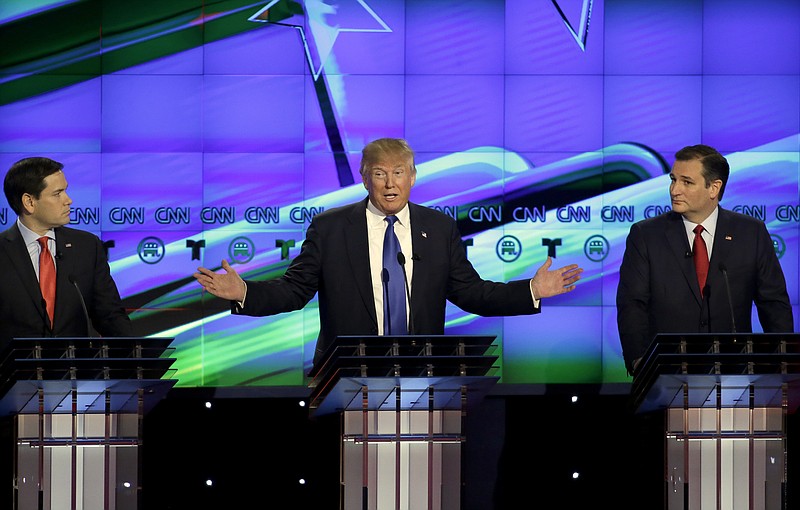It might have made more sense for Sens. Ted Cruz, R-Texas, and Marco Rubio, R-Fla., to have verbally punched businessman Donald Trump at the first Republican presidential primary debate in August - or not.
But they evidently believed what lots of people across the nation believed - that a blustering, profane, self-centered, policy-lite reality TV host would not catch on in a serious campaign for the world's most difficult job.
They were wrong.
So when Cruz and Rubio took turns battering Trump with the truth in Thursday night's debate in Houston, six months after that first debate, the delegate front-runner may have stumbled - or not.
Both senators were able to assail the New York businessman with the truth about his hiring illegal immigrants, his grasp of policy details, his issue flip-flops, his taxes and his dubious stance as a Republican, but his supporters may not care.
They buy into his righteous anger over what has happened to the country over the last seven years - the lack of concern over illegal immigration, the Affordable Care Act crammed down their throats, the arrogance of an executive pen and phone held over their heads, the race politics.
If Trump says "We're Going To Make America Great Again," they believe it no matter what little is behind it. If he says the country is going to build a wall along the Southern border and make Mexico pay for it, they're with him. If he says America again will show the world who's boss, they love it.
Apparently, they're delighted when he talks over other candidates, taunts his fellow Republicans with playground insults and is altogether uncivil.
When it comes to supporting Trump, they decided early on they liked what they saw, vowed to transform that support into votes and never felt the need to peel away.
On the other hand, his national support in the most recent average of polls by Real Clear Politics is 33.2 percent of Republicans, as Cruz pointed out during the debate. In other words, two-thirds of the GOP electorate wants someone else.
Unless the non-Trump votes coalesce around one candidate and quickly, though, he'll continue to win primaries and caucuses. And the party will have before it a nominee unlike any it's ever had before and one whose personal polarization could make him the most loved and hated candidate ever in a presidential race.
So Cruz and Rubio can hit Trump with all they've got in front of huge television audiences, and carefully elucidate their own policies, but until they turn some of his supporters their way it may be all sound and fury, signifying nothing.
